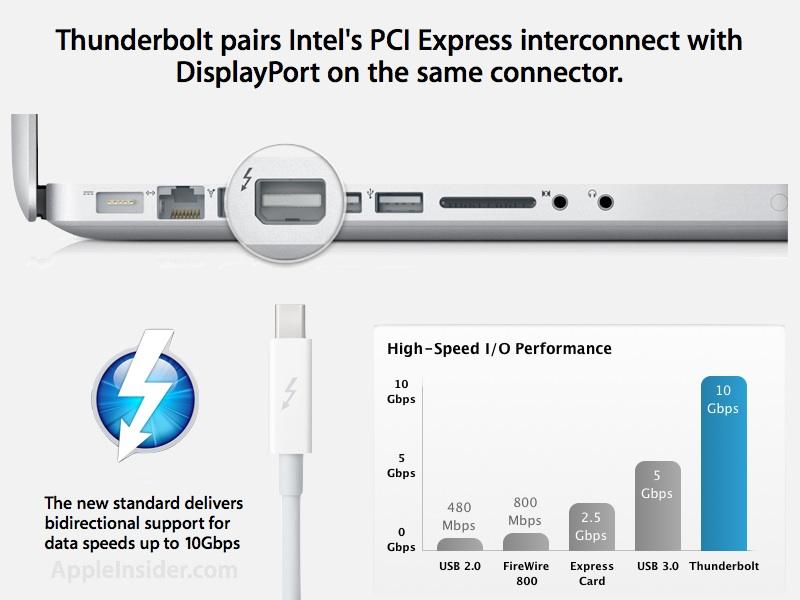HP exec dismisses Apple and Intel's Thunderbolt in favor of USB 3.0
HP's worldwide marketing manager for desktops, Xavier Lauwaert, spoke with PCWorld this week, and revealed that HP considered placing Thunderbolt in its new desktops revealed this week. But the company ultimately decided to stick with another specification also created by Intel: USB 3.0.
However, Lauwaert also revealed that HP has not ruled out placing Thunderbolt in future hardware. For now, though, the high-speed port was not appealing enough to the Palo Alto, Calif., PC maker.
"We did look at [Thunderbolt]," he said. "We're still looking into it. Haven't found a value proposition yet."
HP unveiled three new desktop PCs on Monday. One of the models, the Pavilion HPE H8 series, can be configured to include USB 3.0 ports.
Lauwaert said PC makers are "content" with the expansion of USB 3.0. He characterized Thunderbolt as a "more fancy solution" that HP is "not convinced" it should pursue.
For its part, Intel has said it views USB 3.0 and Thunderbolt as "complementary" to one another. The chipmaker has also encouraged developers to support both the Thunderbolt and USB 3.0 standards with any external peripherals.
Support for both Thunderbolt and USB 3.0 will appear in Intel's next-generation processors, code-named "Ivy Bridge." Those chips, which will arrive in 2012, are the successor to the "Sandy Bridge" processors that began shipping earlier this year.
At 10Gbps, Thunderbolt's data transfer speeds are 20 times faster than the current, widely available USB 2.0 specification. It is also twice as fast as USB 3.0, which offers 5Gbps speeds.
Thunderbolt debuted on Apple's latest MacBook Pro notebooks in February, followed by an iMac refresh released earlier this month. Apple is expected to quickly introduce Thunderbolt to the rest of its Mac lineup with subsequent hardware updates.
 Katie Marsal
Katie Marsal








 Amber Neely
Amber Neely
 Thomas Sibilly
Thomas Sibilly
 AppleInsider Staff
AppleInsider Staff
 William Gallagher
William Gallagher
 Malcolm Owen
Malcolm Owen
 Christine McKee
Christine McKee









132 Comments
Didnt buy HP Before or after this comment.
While the Notebook I have to use at work is an HP, Its not my choice.
Is it not possible to have Both Ports? If they want to provide options that would be a good one in my opinion.
To my knowledge, Thunderbolt is 10Gbps in both directions at the same time. That's very different than just 10Gbps. And USB3.0 has a theoretical max of 5Gbps, and will surely never once reach that speed outside of a theoretical tech demo. Also, it's not, to my knowledge, 5Gbps simultaneous in and out (could be wrong, but I don't think so), so yes, it's fine for iPhones, point-and-shoot cameras, etc., but give me Thunderbolt any day for storage, HD recorders, SLRs... and let's not forget the ability to daisy-chain an Ultra HD monitor off of that one single port at the same time. Fancy? Yes. Worthwhile? Absolutely.
To my knowledge, Thunderbolt is 10Gbps in both directions at the same time. That's very different than just 10Gbps. And USB3.0 has a theoretical max of 5Gbps, and will surely never once reach that speed outside of a theoretical tech demo. Also, it's not, to my knowledge, 5Gbps simultaneous in and out (could be wrong, but I don't think so), so yes, it's fine for iPhones, point-and-shoot cameras, etc., but give me Thunderbolt any day for storage, HD recorders, SLRs... and let's not forget the ability to daisy-chain an Ultra HD monitor off of that one single port at the same time. Fancy? Yes. Worthwhile? Absolutely.
The thing is, if not many companies are using it -- not just PC's but companies that make HD Recorders and external hard drives don't support it, then why should a company like HP support it?
HP may not even be around in a couple of years. That's how well they're doing. So I wouldn't put much (well, ANY) trust in their assessment of anything.
The thing is, if not many companies are using it -- not just PC's but companies that make HD Recorders and external hard drives don't support it, then why should a company like HP support it?
That's a good and fair point. But it's also the problem with HP: There's not a cutting-edge or innovative bone in their corporate body. They'll do about as well as the cutthroat PC business does. No better. And maybe worse. Nothing distinguishes them.
That apple got back into the printer business. HP is extraordinarily irresponsible in terms of waste lack of compatibility and lack of reliability (in my experience)
If HP doesn't support what is clearly a superior technology, then let them rot in their own offal